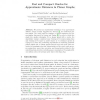876 search results - page 11 / 176 » Limits on the Usefulness of Random Oracles |
CCS
2007
ACM
14 years 4 months ago
2007
ACM
In this paper we construct two new fuzzy identity-based encryption (IBE) schemes in the random oracle model. Not only do our schemes provide public parameters whose size is indepe...
SCN
2008
Springer
13 years 10 months ago
2008
Springer
We present an implementation of the protocol of Lindell and Pinkas for secure two-party computation which is secure against malicious adversaries [13]. This is the first running sy...
CCS
2007
ACM
14 years 4 months ago
2007
ACM
In this work we re-visit the question of building cryptographic primitives that remain secure even when queried on inputs that depend on the secret key. This was investigated by B...
ESA
2007
Springer
14 years 4 months ago
2007
Springer
We present an experimental evaluation of an approximate distance oracle recently suggested by Thorup [1] for undirected planar graphs. The oracle uses the existence of graph separa...
TCS
1998
13 years 10 months ago
1998
Results on random oracles typically involve showing that a class {X : P(X)} has Lebesgue measure one, i.e., that some property P(X) holds for “almost every X.” A potentially m...

